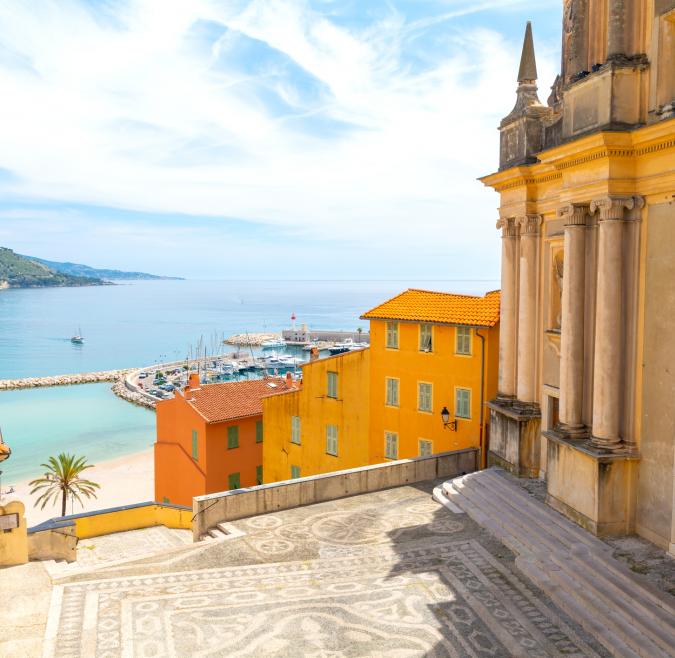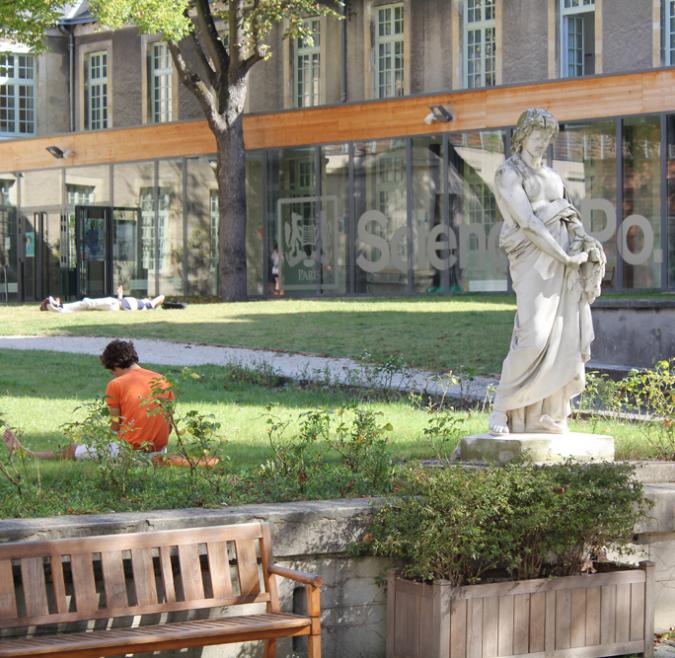Sciences Po (France)
The Program
Right in the heart of Paris, Sciences Po students are woven into the fabric of the city's culture for while they investigate social issues and gain French fluency
The program’s academic strengths are political science (international relations, political economy, and public policy), communications, sociology, and modern history. Students can take courses in French and/or English.
Program Locations

Menton
With beautiful weather year-round and a spot on the Mediterranean Sea, it is surprising that this old city on the French Riviera has yet to find its way onto many tourists’ itineraries. But all the better for you! Menton is a charming old city with beautiful gardens, buildings, markets and beaches. Its gentle climate made it the perfect place to grow lemons. Every February, Menton celebrates the fruit with in its annual Lemon Festival. Menton, which belonged to the Republic of Genoa in the 13th century, is within walking distance of Italy.
France
Paris
Remember what Hemingway wrote: "If you are lucky enough to have lived in Paris as a young man [or woman!], then wherever you go for the rest of your life, it stays with you, for Paris is a moveable feast." And this moveable feast — the "City of Light" — is not only the capital of a major European power, but home to a multicultural population ranging from diverse ethnic communities, artists , municipal workers and young students like yourself. It's both a museum city and a monumental architectural experiment where, in half an hour, you can walk from Roman ruins, past the 12th-century cathedral of Notre Dame, to the 21st-century Bibliothèque Nationale de France. Make Paris your home for a semester or a year, and you’ll be living and studying in one of the most magnificent cities in the world.

Reims
Less than an hour from Paris by TGV is Reims (pronounced in French as rince or for the English speakers out there it is pronounced rance). Reims is the capital of the Champagne-Ardenne region. And yes, in a region named Champagne-Ardenne, Reims is one of the main producers of champagne in France. Bombed during World War I and again partially destroyed in World War II, the majority of Reims was rebuilt in the art deco and art nouveau style. However, remnants of Reims’ past can still be found around the city—particularly in its famous cathedral that dates back to 1211 the former site of the crowning of France’s kings. It is the largest city in the region and has plenty of museums, restaurants, cafes and parks to keep you immersed in la vie française
Academics
In order to have an idea of what classes are available, you should visit the Sciences Po website.
Students will participate in a one week orientation program that includes methodology courses with professors from Sciences Po- Paris. When registering for classes, you can choose among 240 different courses in the Social Sciences, Communications and the Humanities, depending on your needs and level of French proficiency. When looking for courses, be sure that you are looking at undergraduate-level courses in the correct term of study and on the Paris campus. *Please note: there is no Add/Drop period at Sciences Po.
Students can take classes in French only (to do this Sciences Po- Paris recommends that students are at the advanced level), English only, or a combination of English and French. All students will be required to enroll in a French language class while at Sciences Po. One non-academic course, such as sports, dance or photography may be taken per semester; however, conditions do apply.
You will need to be sure that you are registered as a full time student according to the Sciences Po and Rutgers University. That means you will need to take at least 24-30 ECTS credits (12-15 RU credits) each semester. Thus, most students take four to five classes a term at the Sciences Po. It is not possible to take classes as not-for-credit or pass/fail.
For information about Study Abroad credit transfer, registration, and transcripts please visit the Academics section of our website.
Housing and Meals
Sciences Po does not offer any on-campus housing, but has great housing resources to check out here & here. You will be responsible for finding your own housing and purchasing your own food on this program. Students are encouraged to begin their housing search as early as possible, prior to your arrival in Paris. Please note, although it can be very useful to start your research before arrival, we do NOT recommend you rent an apartment sight unseen from a stranger.
Students usually find housing consisting of small rooms or flat shares for 500-750 Euros per month. Some students also find demi au pair placements, in which students are placed in French homes as tutors or baby-sitters and must provide 10-15 hours of work per week in exchange for a free room with the family. Some students also opt for a homestay, in which students live with a family and are usually provided with meals for 500-800 Euros per month.
Here are some additional resources for accommodations that students have found helpful:
-
Sciences Po housing page
-
For roommate options, contact Appartager.
-
For homestay options, contact Atome or Paris Language Solutions to find out more
-
Look for housing opportunities in France-USA Contacts (FUSAC) magazine;
-
Consult housing website De Particulier à Particulier
-
Paris Academic Rentals (Chuck Dressner) at housing@parisacademicrentals.com
-
Cité Internationale Universitaire de Paris (CIUP), temporary housing, located in the 14th arrondissement (Fall/Yearlong only). Space is limited, so reserve this early.
Financial Information
Program Costs
| NJ Resident | non-NJ Resident | |
|---|---|---|
| ATW Program cost* | $9,000 | $13,200 |
Program Cost includes:
- Tuition
- Welcome Program
- Administrative Fees
- Emergency Medical Access Abroad
- *Access the World (ATW)
Out-of-Pocket Costs
| Housing | $5,000 |
| Meals | $2,300 |
| Airfare | $1,100 |
| Local Transportation | $250 |
| Visa (Estimate is for US Citizens) | $450 |
| Books and Classroom Materials | $100 |
| Personal Expenses | $1,500 |
| Total | $10,700.00 |
Out-of-Pocket Cost includes:
The above costs are estimations and represent the known out-of-pocket costs students encounter during their time abroad.
Some of these expenses will be paid for prior to going abroad, such as an airline ticket and visa costs, while some of these expenses, such as meals and local transportation, will be paid in-country as part of your daily expenses. As you plan, you will need to budget these costs and spend wisely throughout your time abroad.
Program Costs
| NJ Resident | non-NJ Resident | |
|---|---|---|
| ATW Program cost* | $9,000 | $13,200 |
Program Cost includes:
- Tuition
- Welcome Program
- Administrative Fees
- Emergency Medical Access Abroad
- *Access the World (ATW)
Out-of-Pocket Costs
| Housing | $5,000 |
| Meals | $2,300 |
| Airfare | $1,100 |
| Local Transportation | $250 |
| Visa (Estimate is for US Citizens) | $450 |
| Books and Classroom Materials | $100 |
| Personal Expenses | $1,500 |
| Total | $10,700.00 |
Out-of-Pocket Cost includes:
The above costs are estimations and represent the known out-of-pocket costs students encounter during their time abroad.
Some of these expenses will be paid for prior to going abroad, such as an airline ticket and visa costs, while some of these expenses, such as meals and local transportation, will be paid in-country as part of your daily expenses. As you plan, you will need to budget these costs and spend wisely throughout your time abroad.

